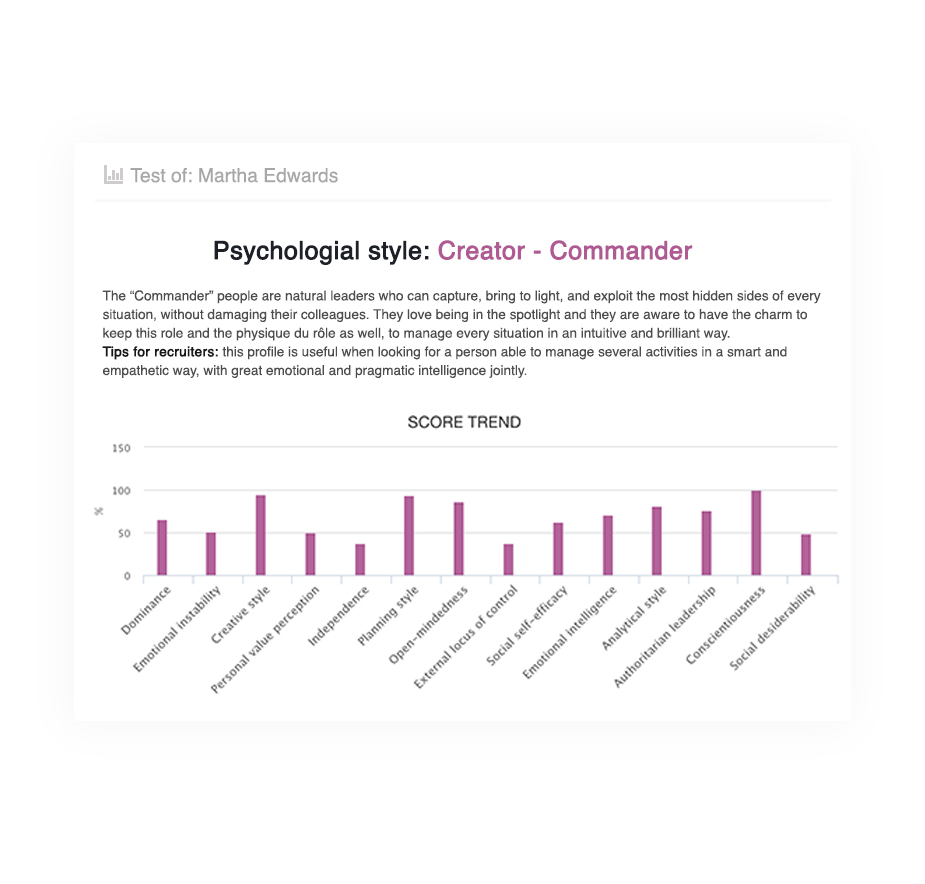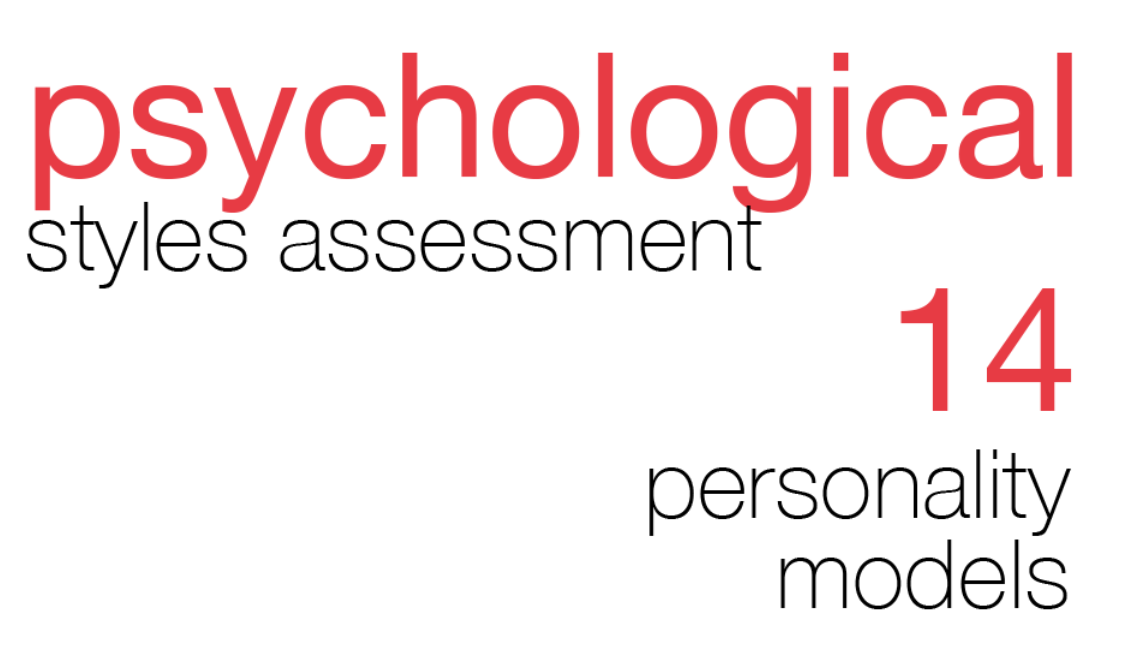
what are psychological styles?
A cloud solution for the assessment of psychological styles
The psychological styles assessment test allows you to get an initial psychological profiling of candidates and employees.
The test costs 5 credits and allows to cross 14 personality dimensions (emotional instability, independence, etc.) with the seniority, role, gender and education level of the examinees, investigating the adaptability to a certain profession or business context with a high degree of accuracy.
Thanks to a study on a heterogeneous sample of 100,000 candidates, in collaboration with Università Cattolica of Milan, the test has defined 14 personality models within which the person can be placed.

what are psychological styles?
A cloud solution for the assessment of psychological styles
The psychological styles assessment test allows you to get an initial psychological profiling of candidates and employees.
The test costs 5 credits and allows to cross 14 personality dimensions (emotional instability, independence, etc.) with the seniority, role, gender and education level of the examinees, investigating the adaptability to a certain profession or business context with a high degree of accuracy.
Thanks to a study on a heterogeneous sample of 100,000 candidates, in collaboration with Università Cattolica of Milan, the test has defined 14 personality models within which the person can be placed.
Register and get a 21-day free trial of SoftskillLab!
All the psychological styles listed below, as well as the other skills on the platform, can be measured individually with an ad hoc test, or can be combined to create a tailored assessment depending on its purpose.
personality dimensions
14 psychological dimensions cross-referenced with levels of seniority, role, gender and education level
dominance
Proneness to exercise control over all situations by imposing your vision and your way of doing things.
emotional instability
Proneness to be emotionally overwhelmed by situations without regulating your own emotions or affective states.
creative style
People high in this dimension, tend to be open minded, to explore and connect even distant ideas to create something new, useful, and meaningful.
personal value perception
People high in this dimension tend to perceive themselves as highly valuable, often, they also perceive that their value is not fully and properly recognized by others.
independence
Tendency to be independent, to perform task alone and to take decisions alone.
planning style
People high in this dimension tend to deeply analyze each task by identifying all the useful steps required to accomplish the final goal, which is always clear and defined.
open-mindedness
Proneness to appreciate even different, novel, unusual ideas and to accept that discrepancies can occur.
external locus of control
Tendency to ascribe their problems, success, or misfortunes to Destiny and not to themselves.
social self-efficacy
Perception of being able to carry out a given task in the best way.
emotional intelligence
Ability to identify and manage our emotions and the emotions of other people.
analytical style
Proneness to deepen a given issue, a situation or a concept or a task by looking into its essential elements, in order to understand the underlying mechanism.
authoritarian leadership
Tendency to exercise a strict control over other people by applying rigorous norms followed either by rewards or punishments.
conscientiousness
Proneness to be careful in accomplishing a task, and to realize it fully till the end.
social desiderability
People high in this dimension, tend to behave and to respond in the way they think other people expect they do, to be viewed favorably by others.
personality dimensions
14 psychological dimensions cross-referenced with levels of seniority, role, gender and education level
dominance
Proneness to exercise control over all situations by imposing your vision and your way of doing things.
emotional instability
Proneness to be emotionally overwhelmed by situations without regulating your own emotions or affective states.
creative style
People high in this dimension, tend to be open minded, to explore and connect even distant ideas to create something new, useful, and meaningful.
personal value perception
People high in this dimension tend to perceive themselves as highly valuable, often, they also perceive that their value is not fully and properly recognized by others.
independence
Tendency to be independent, to perform task alone and to take decisions alone.
planning style
People high in this dimension tend to deeply analyze each task by identifying all the useful steps required to accomplish the final goal, which is always clear and defined.
open-mindedness
Proneness to appreciate even different, novel, unusual ideas and to accept that discrepancies can occur.
external locus of control
Tendency to ascribe their problems, success, or misfortunes to Destiny and not to themselves.
social self-efficacy
Perception of being able to carry out a given task in the best way.
emotional intelligence
Ability to identify and manage our emotions and the emotions of other people.
analytical style
Proneness to deepen a given issue, a situation or a concept or a task by looking into its essential elements, in order to understand the underlying mechanism.
authoritarian leadership
Tendency to exercise a strict control over other people by applying rigorous norms followed either by rewards or punishments.
conscientiousness
Proneness to be careful in accomplishing a task, and to realize it fully till the end.
social desiderability
People high in this dimension, tend to behave and to respond in the way they think other people expect they do, to be viewed favorably by others.
resulting psychological models
The final result places the person in one of the 14 psychological styles
For each model, a detailed description of the corresponding psychological style is provided.
The 14 dimensions are represented by a histogram that allows a simple and intuitive understanding of the prevailing characteristics and their weight in the overall assessment.
The 14 models were grouped into 4 macro-categories:
- Inventors (commander, explorer, creative, philosopher)
- Pragmatists (investigator, adventurer, scientist, wise)
- Faithful (paladin, guardian, judge)
- Magisters (governor, inspirer, instructor)

resulting psychological models
The final result places the person in one of the 14 psychological styles
For each model, a detailed description of the corresponding psychological style is provided.
The 14 dimensions are represented by a histogram that allows a simple and intuitive understanding of the prevailing characteristics and their weight in the overall assessment.
The 14 models were grouped into 4 macro-categories:
- Inventors (commander, explorer, creative, philosopher)
- Pragmatists (investigator, adventurer, scientist, wise)
- Faithful (paladin, guardian, judge)
- Magisters (governor, inspirer, instructor)

F.A.Q.
FREQUENTLY ASKED QUESTIONS
F.A.Q.

